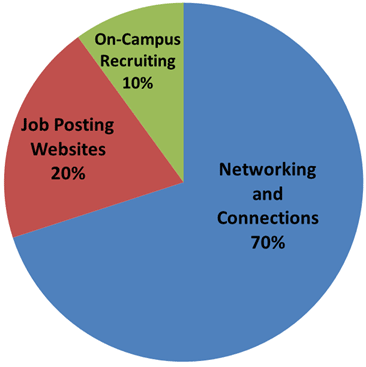
What is networking?
Networking is all about discovering and utilizing connections between people and tapping into your circle of friends, family, professors, previous employers and University of Minnesota Crookston (U of M Crookston) Alumni. Remember, networking isn’t about schmoozing or begging for a job. Networking is about making connections to:
- gain information and advice about a career field, industry or organization,
- learn more about possible job opportunities,
- connect with more people who are doing the things you want to do, and
- tell people more about yourself.

Why is Networking Important?
Over 80% of jobs are not posted online and are obtained through networking. As you can see from the pie chart below, networking plays a critical role in 70% of jobs across the country.
Direct contact with people, preferably face-to-face, is one of the most effective ways to learn about career fields and discover internship and job opportunities. As you begin networking as part of your job or internship search make sure you set specific, attainable goals for yourself about what you want to accomplish.
Find Networking Contacts with LinkedIn
One of the best ways to find networking contacts is through LinkedIn. Commonly known as the “professional Facebook”, LinkedIn is a great resource to network, research companies of interest, locate informational interview contacts, and improve your personal brand. This free site opens the door to over 70 million professionals around the globe, representing 150 industries. Create an account today and begin expanding your professional network. To make the most of your LinkedIn experience, be sure to join the U of M Crookston Alumni group!
As you search for networking contacts, keep these helpful tips in mind:
- Share information, ideas, resources, and contacts with others. Networking is a two way process.
- Know basic information about careers that interest you.
- Think of everyone you meet as a networking contact.
- Keep a well documented record of your contacts – how, when, details of the conversation and any follow up necessary Another great way to make networking contacts is through your friends and family. Talk to your parents, professors, high school teachers, and U of M Crookston friends about what career paths interest you. Ask them to help you make connections with people who could tell you more about the careers that interest you.
How to Send Messages Via LinkedIn Groups
Your LinkedIn Profile
First impressions are important and your LinkedIn profile is often the first link that occurs when Googling your name. We’ve now added LinkedIn profile reviews alongside our scheduled daily resume and cover letter reviews. Make sure you’re on-line presence matches the quality of your resume. Stop by during scheduled review hours to receive tips and advice to polish up your LinkedIn profile prior.
Connect with a Contact
Once you’ve found a networking contact, you need to reach out to them to schedule an informational interview. Here is a sample message you could use when it’s time to connect with a networking contact. Make sure you include a specific question or two in the email so the contact understands what you want to discuss as well as your contact information.
Informational Interviewing
The best way to learn about a career is to talk to someone who’s actually in it every day! After you’ve found connections from your friends, family, and LinkedIn contact them to schedule a brief face-to-face or phone informational interview.
The purpose of an informational interview is to learn more about an industry or career field, not to ask for an internship or job. When you call to schedule the informational interview tell your contact about your interest in their field and your curiosity to learn more.
Once the interview is scheduled you will need to prepare insightful questions to ask your contact as well as explanations about why you’re interested in this field. You can use this list of questions to help you begin but make sure you also research the company and prepare questions specific to their work. Make sure you can clearly highlight why you want to take this career path and what strengths you have to contribute to that specific line of work. Remember, you’re not trying to get a job, just trying to better understand the field while building your professional network and practicing your interview skills.
In preparation for your informational interview, make sure you:
- Know your skills, interests, qualifications, and goals and can articulate them.
- Have a 1 – 2 minute pitch prepared that succinctly describes your background and what your goals are. If you need help developing your elevator speech check out our Elevator Speech Worksheet.
- Know what it is you want to take away from the conversation.
- Be polite, professional, and thankful. Send thank you notes after meetings or conversations.
- Keep in touch. After being introduced to new people, follow-up with a short communication such as an e-mail or a phone call.